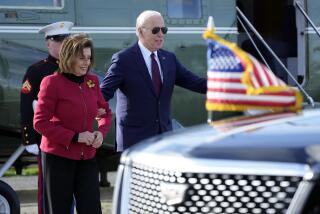U.S. president less taken with Kremlin chief than at outset
- Share via
WASHINGTON — President Bush, who delivered a sanguine assessment of Russian President Vladimir V. Putin shortly after taking office, presented a decidedly different view of his Kremlin counterpart Wednesday.
“He was wily. He wouldn’t tip his hand,” Bush said of his most recent encounter with Putin.
The president was referring to Putin’s refusal during their meeting last month in Australia to reveal the contenders to succeed him at the Kremlin. The Russian president’s second term ends next spring.
Bush’s comments at a White House news conference reflected the cooling that has marked the U.S.-Russian relationship in recent months. The two countries have diverged over U.S. concerns about the Kremlin’s commitment to democracy and over foreign policy differences, notably toward Iran.
The president also used his news conference in the press briefing room to pressure the Democratic congressional leadership to speed action on appropriations bills and other measures central to Bush’s domestic agenda.
Suggesting that he was not optimistic about Russia’s political course, Bush said, “In terms of whether or not it’s possible to reprogram the kind of basic Russian DNA, which is a centralized authority, that’s hard to do.”
But he said he and the Russian president, who visited Tehran this week, continue to agree that “it’s not in the world’s interest for Iran to have the capacity to make a nuclear weapon.”
In Tehran on Tuesday, Putin defended Iran’s right to develop a civilian nuclear power program, a statement that contrasted sharply with the Bush administration’s expectation that he would take a harder line toward Tehran’s uranium enrichment ambitions.
Bush, who said after his initial meeting with Putin in 2001 that he had looked into his eyes “and I was able to get a sense of his soul,” chuckled when told that Sen. John McCain (R-Ariz.) had said at a presidential campaign stop that when he himself looked into Putin’s eyes, he “saw three things: a K and a G and a B.” Putin had been a KGB agent in the Soviet years.
“Pretty good line,” Bush said, with a smile.
For the second consecutive news conference, Bush was adamant in his refusal to discuss what has been reported as an Israeli air attack on a site in Syria believed to have been part of a nuclear development program.
At times defensive, at times taking an aggressive approach toward the Democratic leadership of the House and Senate, Bush chastised Congress for failing to send him 12 overdue appropriations measures. He also pressed it to approve four trade pacts and renew his centerpiece education program.
Even as he criticized what he said was the lack of progress on Capitol Hill, the president said that “we’re finding common ground on Iraq.”
Bush said he believed “the debate has shifted” in the wake of congressional testimony last month by Ryan Crocker, the U.S. ambassador to Iraq, and Gen. David H. Petraeus, the top U.S. military officer there. Both said that American troops this year had allowed Iraq to make some progress.
The president’s fresh attacks on Congress suggest that he is building a case against the Democratic majorities in the House and Senate, feeding on public opinion polls that show declining support for the legislative branch.
House Speaker Nancy Pelosi (D-San Francisco) called Bush’s attack “partisan” and an example of “the president claiming to seek common ground at the same time he is bitterly attacking Congress.”
--
james.gerstenzang @latimes.com
More to Read
Get the L.A. Times Politics newsletter
Deeply reported insights into legislation, politics and policy from Sacramento, Washington and beyond. In your inbox three times per week.
You may occasionally receive promotional content from the Los Angeles Times.










